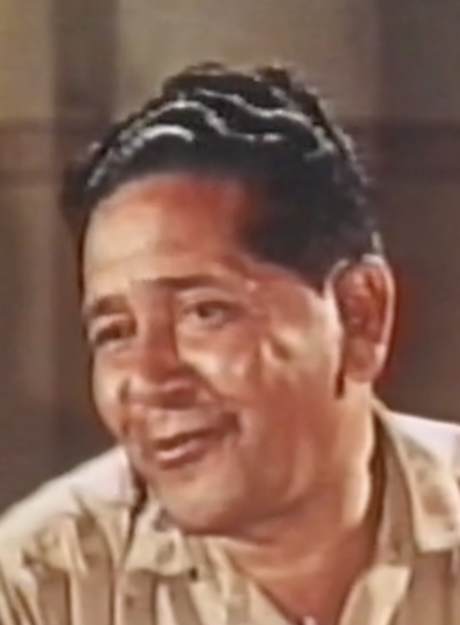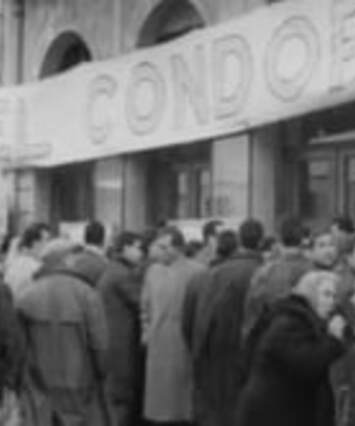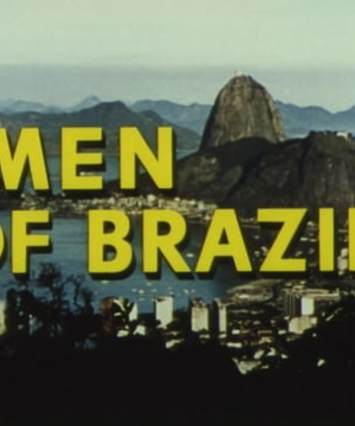Damásio Cardoso
The port of Rio de Janeiro was well-known for constant conflict and endemic disorder. Many workers carried a gun or knife. Robberies and strikes caused such a loss of goods that insurance companies imposed a surcharge on all cargo passing through Rio.
Damásio Cardoso was well-known as a strike leader at the port, a tough and proud crane driver, born in Amazonas and of indigenous descent. His conflicts with his opponent, Nelson Marcellino, leader of another group of port workers, were so great that Damásio almost killed him, certain that to resolve this drama one of the two would have to lose his life. What Damásio did not yet know was that Nelson had discovered a new way to resolve differences when he got in touch with people from Moral Re-Armament - MRA - in Santos, during one of his inspections there.
"I warned Nelson that if he tried to work, it would cost him his life." This way of settling accounts was common in the port. "I came prepared for trouble. I added a second revolver to the one I carried permanently, plus a knife. I took a group of well-armed comrades to the depot. Once there I approached Nelson: any movement on his part and I would shoot."
"I expected a violent reaction. To my surprise, he spoke calmly. He told me how sorry he was that we were enemies since in reality we were both on the side of our fellow workers. But that we were going about our struggle the wrong way. He told me of a new task that awaited all dockworkers and that required their unity. To my surprise, he even admitted that he himself had made mistakes and that the Brazilian Port Workers Union was not beyond reproach."
Damásio could not believe his ears, wondering all the while what was behind this cowardice Was it a trick? He found himself holding back the planned attack. But Nelson's attitude inspired the beginning of a change in Damásio.
In August 1954, Nelson and Damásio flew to Caux, with a delegation of eighty-four from Rio, Santos and São Paulo, in a plane specially chartered by the Villares and other industrialists. They were supported by several government ministers, who assumed responsibility for the travel expenses of the delegates from each of their respective departments (the Minister of Transport, for example, in the case of the dock workers). This trip helped to create new attitudes, of which Damásio informed the Minister of Transport. He also spoke about it with the Head of State, Getúlio Vargas, during his meeting with a delegation of port workers. Very directly, Damásio told the president how, although in the past he had walked blindly, he had now decided - without hesitation - to lead his life free of compromise, seeking only what was in accordance with the moral standards in which he believed. He then told him that he intended to fight for statesmen to base their policies on the same foundations.
But the return of Damásio and Nelson was difficult. Everyone at the port knew about their trip together and their public statements, pledging to fight side by side to promote these new ideas. This caused dissension. In addition, the cost of living was rising rapidly and that particular year, 1953, ended without the dock workers receiving any wage increase. They asked for a 50% increase, which the company accepted, provided they were allowed to raise their own rates. The workers agreed to wait for the government's decision. But the government deliberately delayed its response, while the Minister of Labour, João Goulart, persuaded the Duke of Assis and his team, with whom he had connections, to go on strike in protest against the company's attitude. It seemed to Damásio, still vice-president of that union, that this was a proposal with purely political ends and that he could not let it pass without contesting it.
"I decided," he said, "to tour the port with one of the dock locomotives on which we placed a Brazilian flag with the inscription 'Boycott the strike.' Going from warehouse to warehouse, we explained the facts of the situation. When we arrived at shed 7, the locomotive was surrounded by a group of men who were already waiting and a fight broke out. They grabbed me and pinned me down while one of them hit me with a bottle. I woke up in the hospital with eleven stitches in my head, lucky to be alive. Seeing me fall, one of my friends who had moved away, pulled out his gun and shouted: 'The first one who touches Damásio again I will shoot him.' Unfortunately, someone ran to my house and told my wife Nair that I had been killed. Nair, who was pregnant at the time, went into shock and gave birth two months early, prematurely, to our sixth child. Our little girl Angelina was born with deformed legs."
Despite being overwhelmed with anger, Damásio still held back. If God had kept him alive, it would be for some reason. He would have to choose obedience, not rebellion. He felt he should not try to take revenge on his assailant, but, as soon as he recovered, make him his friend. This took time. Every time his attacker saw him, he fled. Finally, they met and reconciled.
Nelson, Damásio and his friends began to meet more frequently and reflect more deeply. They saw that they themselves were not exempt from the things they accused the shady politicians of. For example, among the dock workers there was a widespread custom of lifting goods, particularly foodstuffs, supposedly for their families' needs, but sometimes requiring trucks! One of the groups wanted to minimize this practice, reducing it to a more reasonable level. He realized that nothing would change unless he abandoned all practices at the same time, and it was not long before his example was followed.
Habits do not change overnight. One habit was never to go out unarmed. From the moment it was discovered that differences could be resolved without resorting to violence, being constantly armed was no longer a necessity. However, giving up weapons took courage. "It took me some time," Damásio recalls. "I told myself, sell your two revolvers. One knife will do. An incident that could have ended tragically led me to give up my knife as well. One day, some friends came up to me and made all kinds of hurtful and personally offensive remarks. At first I managed to control myself, but then one of them became so insulting that I forgot all my good resolutions, pulled out my knife and stabbed him in the shoulder."
Until then, the women had been kept away from their husbands' activities and meetings. Now they were involved. Damásio had lived with Nair for twenty years and they had seven children. But his sense of commitment had never gone so far as to make her his wife. This thought occurred to him one morning, to regularize the family's status before God and the world. The wedding took place on December 29, 1956. Before the ceremony, he and Nair went to confession, she for the first time in many years, he for the first time. He was somewhat anxious. The priest had allowed limited time, how, with his past, was he to tell all?
The children were present at their parents' wedding and they lined up all dressed in white, ages two to fifteen, adorable. Angelina was there, her legs had grown strong enough to allow her to walk with the others.
A new spirit was slowly spreading among the dockworkers. Not content with what they had achieved at home, the Rio dockworkers felt the need to tell others of their accomplishments and did not limit themselves to the borders of Brazil. In 1956, six of them, including Damásio, went to Buenos Aires at the invitation of the Argentine Minister of Labour. In 1959, they launched a new venture: they made the film "Men of Brazil". This allowed them to share their experiences much more widely. It did not happen without sacrifice. On several occasions, a hundred men gave up their daily wages to participate in the filming.
The French version was shown for the first time in France on March 23, 1961 in Blanc-Mesnil, an industrial suburb in the north of Paris. It was in the presence of Bernard Hardion, recently returned from a seven-year term as ambassador to Brazil. In his introductory remarks, the diplomat recalled the disastrous conditions under which the port of Rio was operating when he arrived in the country. He then learned of the turnaround created by the port workers. "One day," he said, "I met the protagonists of the movie you are about to see. I can reinforce one point in particular that is as extraordinary as the story itself: it is a true story, without actors, without fiction; a human drama lived by men who are our brothers. These Brazilians, whom I knew and loved, found a path to wisdom and fraternity. They concluded that their experiences carried a message that would interest other nations."
Sources:
- Daniel Dommel's book "Moral Rearmament in Latin America".



